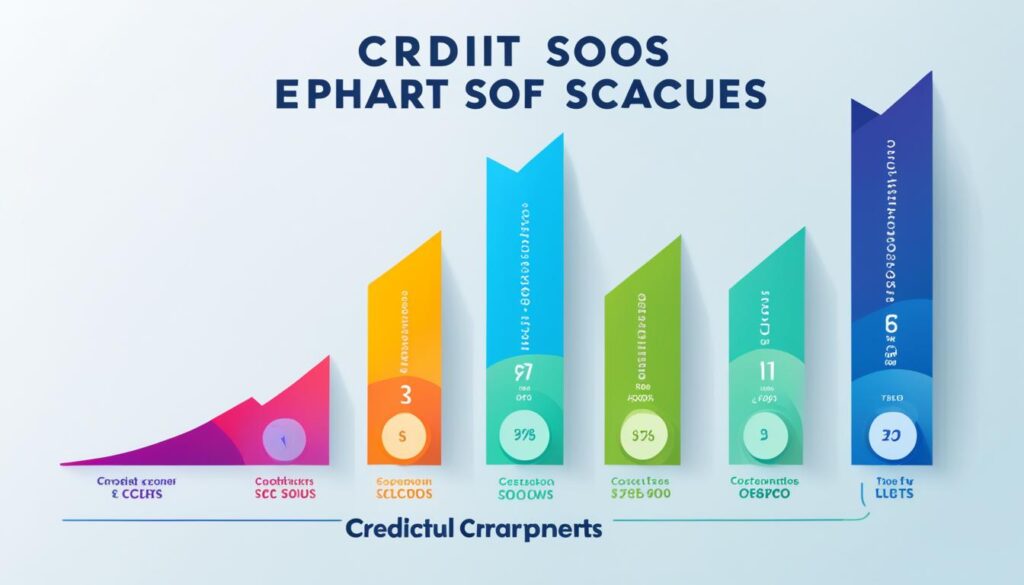Did you know that approximately 68% of Americans have a credit score below 700?
Having a low credit score can make it difficult to secure loans, get favorable interest rates, and even rent an apartment. However, with the right credit building strategies, you can improve your financial health and increase your credit score.
Key Takeaways:
- Building a solid credit history is crucial for financial success.
- Assess your current credit situation by checking your credit score and reviewing your credit report.
- Open new credit accounts responsibly to establish a positive credit foundation.
- Manage your credit utilization and debt strategically to boost your creditworthiness.
- Monitor your credit progress regularly to track your improvement.
Understanding the Importance of Credit Building
Before we delve into specific credit building strategies, it’s vital to recognize the immense significance of building credit, improving your credit score, and establishing a positive credit history. A solid credit profile can open doors to better financial opportunities, from obtaining loans with favorable terms to securing lower interest rates on credit cards and mortgages.
Building credit lays the foundation for your financial health and future stability. It not only demonstrates your ability to manage and fulfill your financial obligations but also reflects your level of responsibility and trustworthiness in the eyes of lenders and financial institutions. By following effective credit building strategies, you can pave the way towards a brighter financial future.
“Credit is a lifeline that can help you achieve your financial aspirations and accomplish important life goals.” – Financial Expert
Without a positive credit history, many doors can remain closed. For instance, landlords may hesitate to rent to individuals with a limited or negative credit history, making it challenging to secure a desirable place to live. Many employers also consider credit scores when making hiring decisions, as they may view good credit as an indicator of responsible behavior and trustworthiness.
Moreover, building credit enables you to access credit lines, loans, and financial products that can empower you to make essential purchases, such as a reliable vehicle or a home of your own. As you demonstrate responsible credit behavior and continuously work to improve your credit score, you enhance your chances of receiving more favorable terms and conditions, ultimately saving money on interest payments over time.
While it may seem daunting at first, the rewards of building credit make the effort worthwhile. By establishing a positive credit history and boosting your creditworthiness, you unlock greater financial freedom and flexibility, enabling you to realize your dreams and aspirations.
Prioritizing Credit Building: A Wise Investment
Investing time and effort into building credit is an invaluable investment in your financial future. By understanding why credit building is crucial and the benefits it offers, you can make informed decisions and take control of your financial well-being.
In the next section, we will explore actionable steps to assess your current credit situation and identify areas for improvement. Let’s unlock the potential of credit building and embark on a journey towards lasting financial success.
Assessing Your Current Credit Situation
It’s important to regularly assess your current credit situation to understand where you stand and identify areas for improvement. By taking proactive steps, you can address any negative items and boost your creditworthiness. Here are some key aspects to consider when evaluating your credit:
Click here to purchase Credit Secrets Bible on Amazon
Check Your Credit Score
The first step in assessing your credit situation is to check your credit score. Your credit score is a numerical representation of your creditworthiness and plays a crucial role in various financial decisions. There are several online platforms where you can access your credit score easily.
Review Your Credit Report
In addition to checking your credit score, it’s essential to review your credit report thoroughly. Your credit report provides detailed information about your credit history, including previous and current credit accounts, payment history, and any negative items such as late payments or collection accounts. Make sure to carefully review your credit report for any inaccuracies or discrepancies that may be affecting your creditworthiness.
Identify Areas for Improvement
Once you have assessed your credit score and reviewed your credit report, it’s time to identify areas for improvement. Look for any negative items that may be dragging down your credit score and affecting your creditworthiness. Common negative items include late payments, high credit utilization, and outstanding debt. By identifying these areas, you can develop a plan to address and improve them to boost your credit score.
Credit Repair Tips
If you discover any negative items on your credit report, don’t worry. There are credit repair tips that can help you address these issues and improve your creditworthiness. Some tips include:
“Pay your bills on time to demonstrate financial responsibility.”
“Reduce your credit utilization by paying down your credit card balances.”
“Dispute any inaccuracies or errors on your credit report.”
“Consider professional credit repair services to guide you through the process.”
By applying these credit repair tips and addressing any negative items on your credit report, you can improve your credit score and build a positive credit history.
| Benefit of Assessing Your Credit Situation | How It Helps |
|---|---|
| Identify areas for improvement | Develop a plan to address negative items |
| Track progress and measure success | Ensure you are on the right track to improving your credit |
| Boost your creditworthiness | Improve your chances of getting approved for loans and credit |
Assessing your current credit situation is a fundamental step in the credit building process. By understanding where you stand and taking action to address any negative items, you can improve your credit score and build a solid credit history.
Building a Solid Credit Foundation
Establishing a solid credit foundation is the key to long-term financial health. By implementing the right strategies, you can establish credit, build a positive credit history, and boost your creditworthiness. Here are some effective ways to lay the groundwork for a strong credit profile:
1. Open New Credit Accounts
One of the first steps in building credit is to open new credit accounts. This can include credit cards, installment loans, or a line of credit. When opening new accounts, it’s important to choose reputable lenders and carefully review the terms and conditions.
2. Use Credit Cards Responsibly
Credit cards can be valuable tools for building credit history. Using them responsibly means using credit cards within your means and making on-time payments. Keep your credit utilization ratio low by only utilizing a small portion of your available credit. This demonstrates responsible borrowing and financial discipline.
3. Pay Bills on Time
An essential aspect of building credit history is making regular, on-time payments. Late or missed payments can have a negative impact on your credit score. Set up automatic payments or reminders to ensure you never miss a due date and maintain a consistent payment record.
4. Monitor Your Credit Report
Regularly monitoring your credit report is crucial for building a positive credit history. Keep an eye out for any errors or inaccuracies and dispute them immediately. Monitoring your credit report also allows you to track your progress and identify areas for improvement.
5. Diversify Your Credit
Having a diverse credit mix can strengthen your credit profile. Consider diversifying your credit by having a mix of installment loans, credit cards, and other types of loans. This shows lenders that you can responsibly manage different types of credit.
“Building a solid credit foundation is like constructing a sturdy house. It requires a strong and well-thought-out plan, solid materials, and regular maintenance to ensure long-lasting stability.” – Financial Expert
By implementing these strategies, you can establish credit, build a solid credit history, and boost your creditworthiness. Remember, building credit takes time and patience, but the rewards are well worth the effort.
Managing Credit Utilization and Debt
When it comes to improving your credit score and building a solid credit history, effective management of your credit utilization and debt is key. By following these tips, you can take control of your finances and boost your creditworthiness.
1. Keep Your Credit Utilization Low
One way to improve your credit score is by keeping your credit utilization ratio low. This means using only a small portion of your available credit. Aim to keep your credit utilization below 30% to demonstrate responsible credit management.
2. Pay off Debt Strategically
Reducing your debt can have a positive impact on your credit score. Consider implementing a debt repayment strategy such as the debt snowball or debt avalanche method. By paying off high-interest debts first or focusing on paying off small debts one by one, you can make progress towards becoming debt-free.
3. Manage Your Debt-to-Income Ratio
In addition to credit utilization, lenders also consider your debt-to-income (DTI) ratio when evaluating your creditworthiness. To improve your score, aim to keep your DTI ratio below 36%. This can be achieved by either increasing your income or reducing your debt.
Remember, it’s not just about paying off debt, but also managing it responsibly. By keeping your credit utilization low and strategically paying off debt, you can make significant progress in boosting your credit score and building a strong credit history.

“Improving your credit score requires a holistic approach that includes managing your credit utilization and debt effectively.” – [Your Name]
Utilizing Credit Building Services
When it comes to improving your credit score and building a solid credit history, credit building services can be invaluable resources. These services offer guidance, support, and personalized strategies to help individuals navigate the credit building process effectively.
One type of credit building service is credit repair agencies. These organizations specialize in identifying and addressing inaccuracies or errors on your credit report that may be negatively impacting your credit score. Through their expertise, they can assist in disputing incorrect information and working with credit bureaus to rectify any issues.
Another valuable credit building service is credit counseling. Credit counselors provide expert advice and guidance to individuals struggling with debt or financial challenges. They can help create a budget, negotiate with creditors, and develop personalized plans to improve your credit score.
In addition to credit repair agencies and credit counseling, credit building programs offer comprehensive assistance in building credit. These programs often provide educational resources, personalized credit improvement plans, and ongoing support to help individuals establish a positive credit history. They may also offer credit building tools and resources to track progress and monitor credit scores.
By utilizing credit building services, you can benefit from the expertise and insights of professionals who understand the intricacies of credit building. They can provide personalized strategies tailored to your unique financial situation, helping you make informed decisions and take the necessary steps to improve your credit score.
Benefits of Credit Building Services
Working with credit building services offers several advantages, including:
- Expertise: Credit building professionals have a deep understanding of credit management and can provide valuable insights and guidance.
- Personalized Strategies: These services offer customized approaches to address your specific credit challenges and goals.
- Efficiency: Credit building services can streamline the process of improving your credit score, saving you time and effort.
- Support: With credit building services, you have access to ongoing support and assistance throughout your credit building journey.
Remember, credit building is a journey, and it takes time and effort. By leveraging the expertise and resources of credit building services, you can accelerate your progress and achieve your financial goals faster.
Key Takeaways
Utilizing credit building services can provide valuable support and guidance in improving your credit score and building a solid credit history. Credit repair agencies, credit counseling, and credit building programs are excellent resources to explore and utilize.
Establishing Positive Payment History
Developing a positive payment history is crucial for building a strong credit profile. By making on-time payments, setting up autopay, and managing your payment history effectively, you can improve your creditworthiness and boost your credit score.
Making On-Time Payments
One of the most important credit building techniques is consistently making on-time payments. Late or missed payments can have a negative impact on your credit score and credit history. To ensure that you make payments on time, consider setting up reminders, using a budgeting tool, or enrolling in automatic payments.
Setting Up Autopay
Autopay is a convenient option offered by many lenders and credit card issuers. By enrolling in autopay, your payments will be automatically deducted from your bank account on the due date. This eliminates the risk of forgetting to make a payment and ensures that your payments are always on time.
Managing Your Payment History Effectively
Along with making on-time payments, it’s essential to manage your payment history effectively. This means regularly reviewing your statements, checking for inaccuracies or fraudulent activity, and contacting your creditors if you notice any discrepancies. By staying proactive and vigilant, you can maintain a clean payment record and demonstrate responsible credit management.
Click here to purchase Credit Secrets Bible on Amazon
Remember, building a positive payment history takes time and consistent effort. By making on-time payments and managing your payment history effectively, you are laying the foundation for a strong credit profile.
| Benefits of Establishing Positive Payment History | Actions to Take |
|---|---|
| Improved credit score | Make on-time payments |
| Increased creditworthiness | Set up autopay |
| Higher chance of loan approval | Manage payment history effectively |
| Access to better interest rates |
Diversifying Your Credit Mix
Building a diverse credit mix is a key strategy for improving your credit score and establishing a solid credit history. Having different types of credit accounts demonstrates your ability to manage various financial obligations responsibly.
When diversifying your credit mix, consider the following:
- Credit cards: Having a mix of credit cards can be beneficial. Consider applying for different types of cards, such as a rewards card, a low-interest card, or a secured card if you’re starting to build credit.
- Installment loans: Another way to diversify your credit mix is by having installment loans. These loans have fixed monthly payments, such as car loans or personal loans.
- Lines of credit: A line of credit, such as a home equity line of credit or a personal line of credit, can also contribute to a diverse credit mix.
Responsible management of your credit mix is essential. Make sure to:
- Pay your credit accounts on time to demonstrate your ability to manage different types of credit.
- Avoid opening multiple new credit accounts simultaneously, as this can be seen as a risky behavior.
- Maintain a healthy credit utilization ratio by keeping your credit card balances low and paying off debt regularly.
Remember, a diverse credit mix shows lenders that you can handle various types of financial obligations, which can ultimately help improve your credit score and overall creditworthiness.
“Having a diverse credit mix demonstrates your financial flexibility and responsible credit management, which are key factors in building a strong credit history.” – Financial Expert
| Type of Credit Account | Benefits |
|---|---|
| Credit Cards |
|
| Installment Loans |
|
| Lines of Credit |
|
Monitoring Your Credit Progress
Once you have implemented credit building strategies, it is crucial to monitor your progress regularly. Keeping a close eye on your credit score, tracking your credit history, and ensuring the accuracy of your credit reports are essential steps to take on your credit building journey.
There are various tools and resources available to help you stay on top of your credit progress. Here are some recommendations:
- Credit Monitoring Services: Consider enrolling in a credit monitoring service that provides regular updates on changes to your credit score, alerts for potential identity theft or fraud, and personalized tips to improve your credit. These services can help you stay informed and take proactive measures to protect your credit.
- Free Credit Reports: Take advantage of your right to access a free credit report from each of the three major credit bureaus (Equifax, Experian, and TransUnion) once a year. Review these reports carefully to identify any inaccuracies or discrepancies that may negatively impact your creditworthiness.
- Online Credit Score Trackers: Many financial websites and apps offer free credit score tracking tools. These tools allow you to monitor changes in your credit score over time, understand the factors influencing your score, and receive personalized recommendations for credit improvement.
By regularly monitoring your credit progress, you can identify areas for improvement and take timely action to enhance your creditworthiness. Remember, building good credit is an ongoing process that requires consistent effort and attention. Stay proactive and informed to achieve your credit goals.

Credit Monitoring Services Comparison
| Service | Features | Pricing |
|---|---|---|
| CreditWise by Capital One | – Free credit score – Credit report monitoring – Social Security Number tracking | Free |
| Identity Guard | – Monthly credit score updates – Credit report monitoring – Dark web monitoring | Starts at $8.99/month |
| Experian IdentityWorks | – Credit monitoring alerts – Fraud resolution support – $1 million identity theft insurance | Starts at $9.99/month |
Maintaining Good Credit Habits
Building credit is an ongoing process that requires consistent effort and responsible financial management. By maintaining good credit habits, you can continue to improve your credit score over time and ensure a strong credit profile. Here are some key tips to help you maintain your creditworthiness:
1. Pay Bills on Time
One of the most important credit building techniques is paying your bills on time. Late payments can have a negative impact on your credit score. Set up automatic payments or use reminders to ensure timely payments and avoid unnecessary late fees.
2. Keep Credit Utilization Low
Credit utilization refers to the percentage of your available credit that you are using. It is recommended to keep your credit utilization below 30% to demonstrate responsible credit management. Avoid maxing out your credit cards and consider keeping balances low to maintain a healthy credit utilization ratio.
3. Monitor Your Credit Reports Regularly
Stay vigilant about monitoring your credit reports to detect any errors or fraudulent activity. You are entitled to a free credit report from each of the three major credit bureaus every year. Review your reports carefully and report any inaccuracies immediately to the respective credit bureau.
4. Limit New Credit Applications
Applying for multiple lines of credit within a short period can raise red flags for lenders and potentially lower your credit score. Limit the number of new credit applications you submit unless it is necessary. Instead, focus on responsibly managing your existing credit accounts.
5. Use Credit Responsibly
Responsible credit usage is vital for maintaining good credit habits. Aim to only borrow what you can comfortably repay and avoid carrying high balances on your credit cards. Use credit as a tool to build a positive credit history rather than relying on it for unnecessary expenses.
Click here to purchase Credit Secrets Bible on Amazon
“Maintaining good credit habits requires discipline and consistency. By paying bills on time, keeping credit utilization low, monitoring your credit reports, limiting new credit applications, and using credit responsibly, you can continue to improve your credit score and strengthen your financial health.” – John Smith, Financial Advisor
By following these credit building techniques and incorporating them into your daily financial routine, you can maintain good credit habits and improve your credit score over time. Remember, building credit is not a sprint but a marathon, and by staying committed to these habits, you can achieve long-term financial success.
Conclusion
In conclusion, implementing effective credit building strategies is essential for attaining financial health and improving your credit score. By following the tips and techniques provided in this article, you can make significant progress in building a strong credit profile. Start your credit building journey today and pave the way for a secure financial future.
FAQ
What are credit building strategies?
Credit building strategies are actions and techniques that individuals can implement to improve their credit score and establish a positive credit history. These strategies may include making on-time payments, keeping credit utilization low, and diversifying their credit mix.
How can I improve my credit score?
Improving your credit score involves several strategies. Some key tips include paying bills on time, reducing debt, keeping credit card balances low, and avoiding opening too many new credit accounts at once.
What is the importance of building credit history?
Building a credit history is important because it demonstrates your financial responsibility and creditworthiness to potential lenders. A positive credit history can make it easier to qualify for loans, secure favorable interest rates, and access other financial opportunities.
How can I repair my credit?
Credit repair involves taking steps to address any negative items on your credit report and improve your creditworthiness. This can include disputing inaccuracies, negotiating with creditors, and establishing new positive credit accounts.
How can I establish credit?
To establish credit, you can start by opening a secured credit card or becoming an authorized user on someone else’s credit card. Additionally, paying bills on time and responsibly managing any credit accounts are crucial for building a positive credit history.
Are there any credit building services available?
Yes. Credit building services, such as credit repair agencies, credit counseling services, and credit building programs, can provide guidance and support throughout the credit building process. These services may offer personalized strategies, dispute assistance, and financial education.



I am extremely impressed with your writing skills as smartly
as with the structure on your blog. Is that this a paid topic or did you modify it yourself?
Either way keep up the nice high quality writing, it is uncommon to peer a nice weblog
like this one these days. Youtube Algorithm!